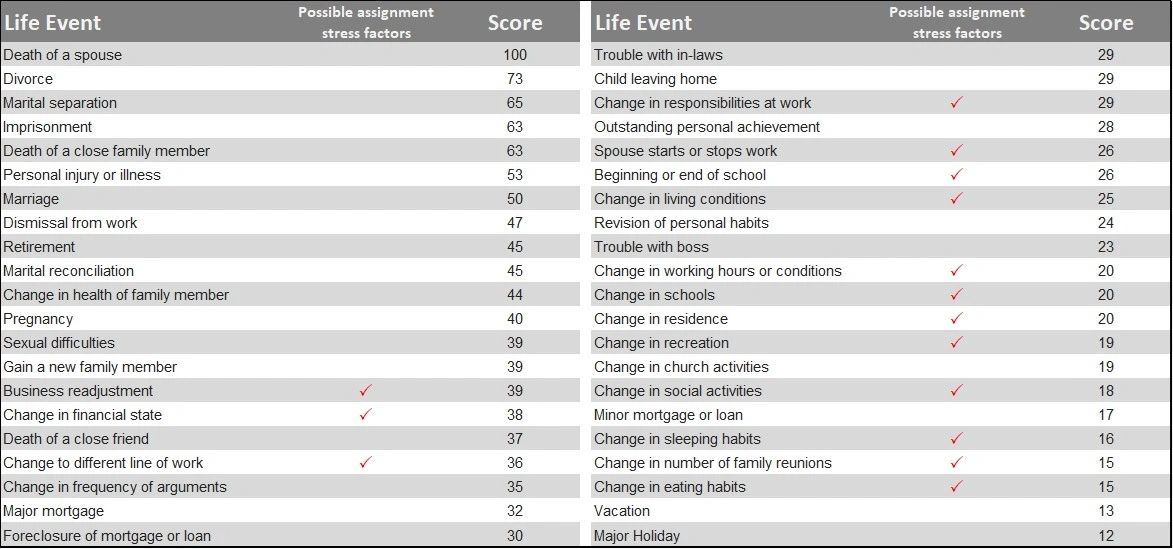The Importance of Wellbeing on International Assignments
Why it is important to always make time for your wellbeing.

Relocating someone overseas for an International Assignment is well established practice for companies all over the world.
They have developed detailed policies and processes to ensure the employee - and sometimes their family - can be moved from their home country and placed in their new (host) location with a minimum of fuss so that the assignee (employee) can start delivering on their assignment. Mobility services ensure that the family has somewhere to live, the children have great schools, that they have access to healthcare, bank accounts, language lessons and, in some cases, cultural training.
These are all fabulous and allow the seamless physical aspects of moving the assignee and their family to the new location and the practical things to enable them to live.
But who looks after their emotional needs?
Utilising the Holmes-Rahe Life Stress Inventory* and scoring all the changes that an assignment brings to a families circumstances such as the change in work, perhaps for the partner too, changing schools, the challenges of a new country and the loss of the organic support network in the home country can lead to scores in the region of 300 which according to Holmes-Rahe significantly increases the risk of stress related illness. It’s easy, therefore, to see how these circumstances can lead to feelings of anxiety, depression, loneliness and other psychological, emotional and social problems. This can massively impact the stability of the family, as well as the assignee’s ability to deliver their assignment objectives.
Understanding the importance of this emotional journey in the context of an international assignment has historically been overlooked. But a better understanding of the emotional journey they are on can lead to a more appropriate response, and a level of support which can help relieve some of the distress they are experiencing.
Heart Relocation has worked alongside [hundreds] of assignees during their relocation process. As such, we understand that everyone finds the transition difficult varying degrees in myriad different ways and to varying degrees. However, we have identified the key areas that are most likely to create stress for a relocating family:
Moving
The act of moving home is universally recognised as one of the top five stressful experiences in anyone’s life. This compounds with a change in work location, a new country and the other factors included below, and will understandably create a stressful situation for any family.
Family
Leaving behind family and friends can be extremely traumatic and challenging, particularly the loss of proximity to a known support network. It is generally more keenly felt by accompanying family members rather than the assignee, as they will not have the security of an allocated workplace to support them, or any specific objectives to focus on.
Language
The ability to communicate is immensely important for human beings and not being able to ask or understand even simple questions and answers can quickly lead to feelings of isolation and loneliness. It can also drive assignees into the “expat bubble” where the isolation can turn into a feeling of imprisonment within the confines of the family environment.
Culture
It is very easy to make unintentional cultural mistakes when you move overseas. The big cultural differences will be obvious, but it is often the smaller things which can impact a family’s integration into the local culture. Making errors such as how you welcome someone to your home, what you offer or don’t offer and how you address people can alienate you from the local community and degrade the whole assignment experience.
Food
For adventurous souls, the ability to try new foods can be an enriching experience but often the comfort foods we grew up with can provide a feeling of safety, security and comfort for many people. This can lead to unexpected instances of distress when you can’t find the familiar food you crave, or - worse still - it is not available. It can sometimes be truly traumatic trying to get children to eat unfamiliar things, and even simple foods such as cornflakes can taste different when manufactured by a different company. This removes the certainty assignees feel around their diet and can cause disruption to their physical and emotional well-being.
Work
Work is generally assumed to a safe place for the assignee. They can feel they belong and are generally welcomed and set to work on a clear objective. But even this assumption that the transition to a new workplace will be easy can present challenges which can impact the assignee’s well-being.
Children
Children pick up the lifestyles and languages of their peers relatively quickly and the younger they are, the easier they seem to find it. But for them it can feel like living between two worlds: worlds with different languages, cultures and values. With their superior language skills, children are often called on to be interpreters for their parents in all sorts of situations, which can confuse roles and cause stress. For example, having to act as an interpreter within a clinical environment (such as a doctor’s office) can be very unsettling for a child.
How can assignees and their families maintain their well-being during a relocation?
As stressful as these circumstances can be, there are actions assignees can take to ease their transition into a new culture.
Every effort should be taken by their employer to give them enough education and support to help them with the initial relocation as well as the ongoing emotional and social challenges.
We provide advice, support and guidance to assignees throughout the relocation process. Some of our top tips include the following:
- Don’t be an island – We encourage assignees to learn the language as quickly as possible and, as scary as it might seem, get out and practise it with the locals. They can more easily integrate into the community with just a few simple phrases.
- Dive in – Immersing themselves in their new home and culture can do wonders for their confidence. We encourage them to walk about, explore, go to free events, join clubs and activities, do courses, have fun outside with the children and make new friends.
- I like to Move it Move it – We remind assignees about the importance of their physical health on their body and mind. Even low levels of activity and the simple act of being outdoors can dramatically decrease stress and a variety of health conditions.
- Relax go and do it – We encourage assignees to find pleasure in the little things and to think of their assigned location as their new home.
- And I miss you – As important as it is for assignees to acknowledge what they miss; we also encourage them to think about all the new things they are able to experience. No one place has all the benefits of another; each country is unique and amazing.
- Emotional honesty – We ask assignees to be open about how they feel and speak with their Global Mobility Consultant/HR Mobility team. They have worked with many hundreds of assignees and will understand how they are feeling, as well as offering practical guidance on how to manage them.
- Ask for help – We remind assignees that it is a sign of strength, not weakness to want to speak to a professional about how they feel. An assignee’s wellness is of massive importance. More and more ordinary people from all cultures are benefiting from confidential support services, realising that this can add greatly to both the assignee and their family’s emotional well-being and quality of life.
Heart Relocation understands that the success of an assignment relies more heavily on the wellness of the assignee and their family than the simple mechanics of physically moving them to a new location. Assignment success, or return of investment, is measured by how effective the assignee has been in delivering to the assignment objectives. We believe that is goes without saying that a less stressed assignee will be more focused, engaged and capable of delivering to those objectives.
Heart Relocation have woven wellness into the very fabric of our assignment management experience through working closely with our partner. We have developed a well-being support package to ensure that our assignees have the knowledge and ability to manage the challenges that they will face on their journey, supported by our incredible relocation team.
To find out more about Heart Relocation’s assignment management programme please contact:
info@heartrelo.com or call +44 (0) 208 124 4444.
* Holmes TH, Rahe RH. The Social Readjustment Rating Scale. J Psychosom Res. 1967;11(2):213–218. doi:10.1016/0022-3999(67)90010-4





 Client Login
Client Login
